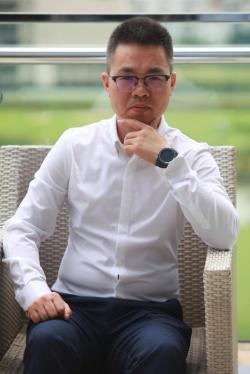
Spurred by Thailand's flagship Eastern Economic Corridor (EEC) initiative and growing economy, second-generation entrepreneurs from China are keen to invest in Thailand despite concerns about state policy consistency.
Bryson Ye, general manager of Bestway Flow Control Technologies Co Ltd, a petrochemical valve maker based in Shanghai, said policy consistency, clarity and stability are key factors in attracting foreign investment, regardless of who is in charge of the government.
"After we've learned that the EEC has kicked off, we will conduct a feasibility study on an investment opportunity in Thailand when we return home," Mr Ye said.
He said there will be so many industries entering Thailand as the country is promoting and incentivising EEC investment.
"We will study whether our business is in an area being promoted. Our client targets are the petrochemical industry and power plants," he said.
Thailand is one of the target countries in Southeast Asia in which the company wants to expand. Currently the firm supplies products to Thailand as an original equipment manufacturer through Tyco Electronics Thailand.
For investment in Thailand, the company is interested in using its own brand, Bestway, and setting up a factory to make its products. The company has manufacturing bases in Shanghai and Zhejiang.

Ye: Policy consistency is paramount
Mr Ye said Thailand is an interesting area for expansion because it has adopted some Western cultural traits and attracts people from around the world. Indonesia is another country in the region where the country is sniffing out investment opportunities.
Mr Ye is a second-generation Chinese entrepreneur. His father set up a petrochemical valve factory in 1979 and eventually established the Bestway brand in 2009.
The company's current production value totals 1 billion yuan (4.91 billion baht) a year. Each year the company exports 500 million yuan in goods, mainly to Europe and the US.
"As a second-generation entrepreneur, my aim is to continue to develop the company for another 40 years until it becomes a centenarian firm," Mr Ye said.
'Built around the family'
Stefanie Yang, senior investment manager of China Momentum Fund LP of Chinese international conglomerate and private equity company Fosun Group, said there are many sectors that present attractive opportunities for Chinese investors in Thailand.
"Thailand has many strong local designer brands for fashion and jewellery and now is a very good time for us to look into them," she said. "We invest in every stage of business and can act as an incubator to help nurture and bring Thai talent and designers to the global stage. Thailand has massive potential and the people have higher purchasing power. What we are looking for is a very strong local brand that has global potential and may still lack resources and capital. We want to come in and help them grow internationally."
The Fosun investment ecosystem includes health, wealth and happiness. The company's twin-driver strategy entails investment in integrated finance such as insurance, wealth management and internet finance, and industrial operations such as health, happiness, steel and property development.
"Our investment strategy is built around the family: what you want to buy is what we want to invest in," Ms Yang said. "Everything related to family consumption, from babies to parents to elders, is interesting for us."

Yang: Attractive opportunities abound
She said Fosun is actively pushing forward the development of the so-called "happiness industry", including tourism, culture, fashion, entertainment, films and TV, as well as the health business, which covers pharmaceutical manufacturing and R&D, medical care service, medical devices and medical diagnosis, pharmaceutical distribution and retail, health insurance, healthcare management service and health products.
Other emerging segments that present attractive opportunities in the region include products related to babies, the ageing population and pets.
"The pet industry is booming in China. It's one of the fastest growth segments," Ms Yang said. "Younger people are becoming more independent and they want to own a pet instead of getting married. Older people also get pets as their companions."
People are also tending to spend more money on their pets, she said, adding that pet food and pet hospitals are some of the key value chains her company is looking into.
"Manufacturing pet food in Thailand presents a very good opportunity for us," Ms Yang said.
China is ranked third worldwide for dog ownership, being home to 27.4 million pet dogs, versus 55.3 million in the US and 35.7 million in Brazil, according to the National Bureau of Statistics of China. The country is also ranked second for cat ownership, home to 58.1 million pet cats, second after the US at 80.6 million.
According to market research firm Euromonitor, the pet care sector in China is on the rise, forecast to grow by more than 50% to $2.6 billion (86.6 billion) by 2019. The growth rate outpaces the US's, which grew by just over 4% in 2015 to an estimated $60.6 billion. As of 2014, 30 million urban households or 7% of the nationwide total owned a dog. Cat owners covered 2% of households.
Meanwhile, one of the concerns for Chinese investors is the murky and unclear political and regulatory environment in many Asean countries.
"We are actively looking for projects here and we have a very strong interest in coming to Thailand and Southeast Asia, but we don't understand much about the political environment in Thailand. This is something we need to understand more," Ms Yang said. "Having a stable political environment is very important for us. This is one of our concerns."
Indonesia is another country that is interesting, she said, adding that there are a lot of opportunities in consumer goods and the financial sector, given the market size and higher disposable income. But she said there are also concerns about political instability there.
Generation rising
Mr Ye and Ms Yang were among 20 Chinese second-generation entrepreneurs visiting Thailand this week under a young leader programme organised by Relay China Youth Elite Association.
Phaichit Viboontanasarn, secretary-general and chief executive of the Thai Chamber of Commerce in China, said these business owners learned about the market environment in Thailand from local economists and entrepreneurs.
Executives from the Stock Exchange of Thailand, Siam Commercial Bank and CP Group lectured them on the Thai economic outlook, the government's policy of promoting overseas investment and EEC initiatives.
"They also learned about the business transition from the first to second generation from CP Group's CP Leadership Institute, which is good on this issue," Mr Phaichit said.
The programme also included advertisements and marketing from Ogilvy and networking with young Thai business owners, he said.
The Thai Chamber of Commerce in China is trying to connect investors there with Thai investors.
"The EEC is the key area attracting attention from Chinese investors," Mr Phaichit said.
This Relay China Youth Elite Association programme was the fourth held in Thailand since 2016. The programme changes each year, bringing participants to learn and seek investment opportunities in various countries in Southeast Asia.
"They want to expand their businesses abroad," said Martin Hang, the training programme's organiser. "The US, UK and Australia are familiar to them or their parents, but Southeast Asia and South Asia present greater opportunities for investment.
Relay China Youth Elite Association was founded in 2008 to unite the young elite in China.
The 200 members are, on average, 30 and hail from China, Hong Kong and Taiwan, with a minimum business turnover of 1 billion yuan per year, said Mr Hang, also the founder of Relay China Magazine.
"We aim to bridge the knowledge gaps and unlock the potential of young Chinese entrepreneurs by allowing them to get a grasp on the business environment and cultures in Thailand and Southeast Asia," he said.
Mr Hang said another key to unlocking the potential of younger Chinese business leaders is allowing them to know the right people and letting them immerse themselves in different cultures and markets.
"If you want to do business here, you need to know the people," he said. "It's important for young entrepreneurs to know the right people and connect with local entrepreneurs who are also second-generation business owners."
Since the first class in 2016, at least three students have invested abroad in the areas of iron trading, investment and property.
"A student in this class is interested in property investment in Pattaya," Mr Hang said. "He is seeking out land to develop a project after finding a local partner."
With over 7,000 members on the platform, Mr Hang said Relay China Magazine is working to give young business leaders a leg up in the world.